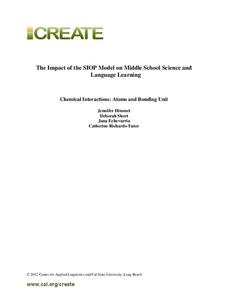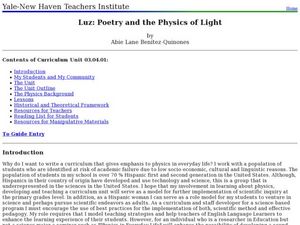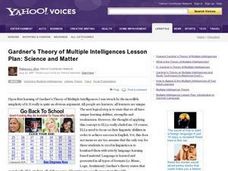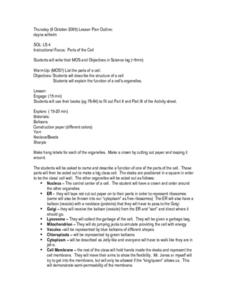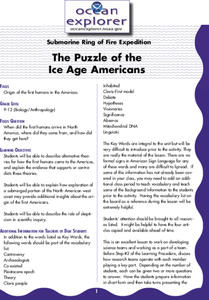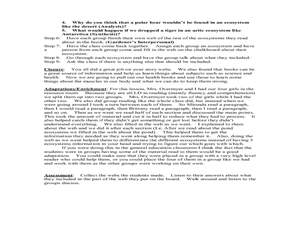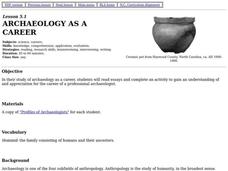Curated OER
A Discourse on the History of Language
Analyze and make inferences from the information used by linguists to construct the evolution of languages. They research different dating techniques to explain how scientists infer age with evidence.
Curated OER
Word Connections
High schoolers explore the science of word associations. They take a memory quiz, read articles on how the brain processes language, explore the concept of false memories and create and illustrate their own original word associations.
Curated OER
Winnie the Pooh and the Honey Tree
Students dictate a story to the teacher. They practice key vocabulary. They be exposed to the language experience approach to writing. They watch a video as a listening exercise.
Curated OER
Ancient Refuge in the Holy Land - International Phonetic Alphabet
Young scholars research the uses and symbols of the International Phonetic Alphabet. They complete a worksheet to translate and transcribe phrases of English into the International Phonetic Alphabet.
Center for Applied Linguistics
Chemical Interactions: Atoms and Bonding
Watch budding chemists interact with the resource on chemical interactions. In the unit, six lessons provide an overview of basic chemistry, from understanding the development of atomic theory to distinguishing between ionic and covalent...
Lerner Publishing
Living or Nonliving
It's alive! Or is it? Through a series of shared readings, whole class activities, and independent exercises children explore the difference between living and non-living things, creating a pair of printable books to demonstrate their...
Lerner Publishing
Teaching Habitats
What makes up a habitat? Use this resource to engage first graders in the exploration of desert, wetland, forest, and ocean habitats. Youngsters classify plants and animals into the four distinct habitats through drawings and cutting and...
Lerner Publishing
Meet the Dinosaurs
Take your class of youngsters on a prehistoric adventure with this four-lesson series on dinosaurs. Accompanying the Meet the Dinosaurs books by Don Lessem, these lessons engage children in writing their own dinosaur books, making...
Curated OER
Designing Experiments - Procedures for Teachers
Students evaluate a hypothetical experimental design and attempt to improve upon it. In this scientific method lesson, students are presented with an experiment and are instructed to determine its flaws. They conduct their own experiment...
Curated OER
How To Make an Artificial Organ
High schoolers examine the advances made in technology with regard to prosthetics and replacement organs and limbs. They describe the anatomy and functions of different organs and create their own artificial organ. They defend and...
Curated OER
Nocturnal vs. Diurnal Animals
First graders identify nocturnal and diurnal animals. In this animal lesson, 1st graders discuss the differences between animals that are active during the day and those that are active at night. Students write summaries about their...
Curated OER
Luz: Poetry and the Physics of Light
Students explore color, light, refraction and reflection. In this light instructional activity students measure solar position and compare it to time.
Curated OER
Chemical Interactions
Students perform scientific investigations to observe chemical reactions. In this chemical reaction lesson students read a passage and identify the cause and effect.
Curated OER
Science and Matter: Multiple Intelligences
Students complete presentations of their understanding of the concept of matter in many different forms. In this matter lesson plan, students use whatever multiple intelligence they feel strongest in to present their presentation.
Curated OER
Bubble and Squeak
Students complete a unit on the chemical and technological processes of food preparation. They observe various experiments, describe changes in materials through cooking, identify safety and hygiene issues, and cook various recipes.
Curated OER
Parts of the Cell
Students examine plant and animal cells to observe the organelles present in the cell, to match the function of each to the organelle on a cell model and to build a model of the plant or animal cell.
Curated OER
The Puzzle of the Ice Age Americans
Students describe alternative theories for how the first humans came to the Americas, and explain evidence that supports or contradicts these theories. They examine the role of skepticism in scientific inquiries.
Curated OER
Graphic Organizers Aid Comprehension
Students create story webs to aid comprehension of ecosystems. In this reading strategies lesson, students discover the importance of organizing information while reading a nonfiction text. Students produce story webs to communicate...
Curated OER
Archaeology as a Career
Fourth graders read about archaeology as a career. They develop a list of questions they would like to ask an archaeologist and then actually interview an archaeologist on the future of archaeology as a career.
Curated OER
Whose Rock Is This Anyway?
Young scholars will seek to understand the events at Pipestone Quarry and what may have caused them. Pipestone Quarry in Pipestone, Minnesota, bears the mythic red Sioux quartzite called Pipestone or Catlinite.
Curated OER
Land Use Issues
In this unit of lessons, students examine analogies and parts of speech. They use land use issues to identify the different parts of speech that they research. They create analogies about the origin of organisms.
Curated OER
Qualitative and Quantitative Data
Seventh graders study the different ways that they have been evaluated over the years. In this qualitative and quantitative lesson students complete a learning activity while in groups.






